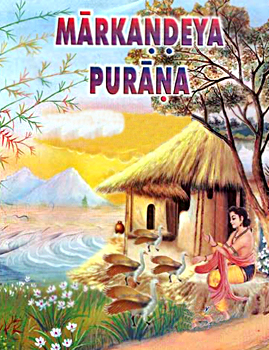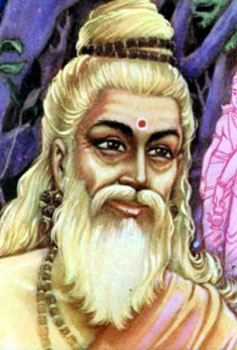 Chapters of Markendeya Purana are one hundred and thirty four in number. The content of this work is contained in the form of a conversation between Markendeya and Jaimini. The Purana actually commences with Jaimini, a pupil of Vyasa, approaching Markandeya, and, after a few eulogies of the Mahabharata, asking him for the answers to four questions, which the great epic leaves unanswered. The first question is how it was that Draupadi was able to become the common wife of the five Pandavas, and the last, why the children of Draupadi were killed at a youthful age. Markandeya does not answer these questions himself, but refers him to four wise birds. In reality these birds were Brahmins who were born as birds in consequence of a curse. These tell Jaimini a series of legends in reply to the propounded questions. In reply to the last question it is related how five angels (Visva Devas) once took the liberty of finding fault with the great saint Vishwamitra when he treated King Hariscandra cruelly. For this, they were cursed by the saint to be born again as human beings, which curse he mitigated so that they should die young and unmarried. The five sons of Draupadi were those angels.
Chapters of Markendeya Purana are one hundred and thirty four in number. The content of this work is contained in the form of a conversation between Markendeya and Jaimini. The Purana actually commences with Jaimini, a pupil of Vyasa, approaching Markandeya, and, after a few eulogies of the Mahabharata, asking him for the answers to four questions, which the great epic leaves unanswered. The first question is how it was that Draupadi was able to become the common wife of the five Pandavas, and the last, why the children of Draupadi were killed at a youthful age. Markandeya does not answer these questions himself, but refers him to four wise birds. In reality these birds were Brahmins who were born as birds in consequence of a curse. These tell Jaimini a series of legends in reply to the propounded questions. In reply to the last question it is related how five angels (Visva Devas) once took the liberty of finding fault with the great saint Vishwamitra when he treated King Hariscandra cruelly. For this, they were cursed by the saint to be born again as human beings, which curse he mitigated so that they should die young and unmarried. The five sons of Draupadi were those angels.
 After the answering of the four questions, there begins a new section (Chapters 10-44) in which a conversation between a father and his son is communicated. This is a very lengthy extension of the dialogue between father and son which is seen in the Mahabharata. It is significant that the son, in the Mahabharata, is called "Intelligent" (Medhavin), while in the Purana he bears the nickname Jada, "the Idiot." As in the case of the Mahabharata, even here the son despises the life of the pious Brahmin, which his father places before him as an ideal. He recalls all his previous births and sees salvation only in an escape from the Samsara. In connection with this the "Idiot" gives a description of the Samsara and of the consequences of sins in various rebirths, and especially of the hells and the punishments of hell, which await the sinner.
After the answering of the four questions, there begins a new section (Chapters 10-44) in which a conversation between a father and his son is communicated. This is a very lengthy extension of the dialogue between father and son which is seen in the Mahabharata. It is significant that the son, in the Mahabharata, is called "Intelligent" (Medhavin), while in the Purana he bears the nickname Jada, "the Idiot." As in the case of the Mahabharata, even here the son despises the life of the pious Brahmin, which his father places before him as an ideal. He recalls all his previous births and sees salvation only in an escape from the Samsara. In connection with this the "Idiot" gives a description of the Samsara and of the consequences of sins in various rebirths, and especially of the hells and the punishments of hell, which await the sinner.
Then there is the tale of Anasuya, which appears like a caricature of the legend of Savitri. Anasuya is the extremely faithful wife of a loathsome, leprous, rough and vulgar Brahmin. In accordance with the Brahmanical principle which equates the husband with the deity, his wife tends him with the greatest love and care, and bears his coarseness with patience. One day the good man, who is also a libertine, expresses the urgent desire of visiting a courtesan who has excited his admiration. As he himself is too ill to go, his faithful wife takes him on her back, in order to carry Lim there. He then accidentally touches a saint with his foot, and the latter curses him that he shall die before the sun rises. Then Anasuya says, "The sun shall not rise." In consequence of her devotion the sun actually does not rise which causes the gods great embarrassment as they receive no sacrifices. There remains nothing but for them to arrange that the charming husband of Anasuya remains alive.
A work complete in itself, which doubtless was only later inserted into the Markandeya Purana, though not later than the 6fch century A. D., is the Devimahatmya, a glorification of the Goddess Durga, who, till the most recent times, has been worshipped with human sacrifices. In the temples of this terrible goddess the Devimahatmya is read daily, and at the great feast of Durga (Durgapuja) in Bengal it is recited with the greatest of solemnity.
Thus discussed are the chapters of the Markandeya Purana.



















